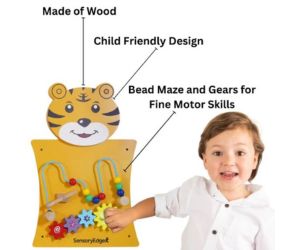
Critical thinking involves the ability to analyze and evaluate information, identify biases and assumptions, and make reasoned judgments. Here are some of the best ways to teach critical thinking skills to young children:
- Encourage questions: Encourage your child to ask questions and think deeply about what they are learning. When they ask questions, try to engage them in a conversation that encourages them to think critically about the topic.
- Teach problem-solving skills: Teach your child problem-solving skills by presenting them with real-world problems to solve. Encourage them to brainstorm solutions and evaluate the pros and cons of each option.
- Use open-ended questions: Ask open-ended questions that require your child to think critically and come up with their own answers. For example, instead of asking “What color is the sky?” ask “Why do you think the sky is blue?”
- Use games and puzzles: Games and puzzles are a great way to teach critical thinking skills. Try games like chess, checkers, or Sudoku, which require children to think ahead and plan their moves.
- Encourage creativity: Encourage your child to be creative and think outside the box. Provide them with opportunities to explore and experiment with new ideas and solutions.
- Teach logic and reasoning: Teach your child basic principles of logic and reasoning, such as cause and effect, deductive reasoning, and inference.
- Model critical thinking: Model critical thinking for your child by engaging in critical thinking yourself. Talk through your own thought process and decision-making, and encourage your child to do the same.
Critical thinking skills are essential for children to navigate the complexities of the world and make informed decisions. Here are some of the ways that critical thinking helps children in life:
- Better decision making: Critical thinking helps children evaluate information, identify biases and assumptions, and make informed decisions. They learn to weigh the pros and cons of each option, consider alternative perspectives, and make reasoned judgments.
- Improved problem-solving: Critical thinking skills help children identify problems, analyze them, and come up with effective solutions. They learn to think outside the box, consider different approaches, and develop creative solutions.
- Increased creativity: Critical thinking encourages children to think creatively and come up with new ideas. They learn to challenge assumptions, question the status quo, and develop innovative solutions.
- Better communication: Critical thinking helps children express their thoughts and ideas more effectively. They learn to articulate their ideas clearly, listen to and consider others’ perspectives, and engage in respectful dialogue.
- Increased independence: Critical thinking helps children become more independent and self-reliant. They learn to take responsibility for their own decisions, evaluate the consequences of their actions, and make informed choices.
- Better academic performance: Critical thinking skills are essential for academic success. Children who are skilled in critical thinking are better able to analyze and evaluate information, develop effective study strategies, and perform better on exams.
There is no valid reason for children not to learn critical thinking skills. In fact, critical thinking is a fundamental skill that helps children develop and grow intellectually and socially. Here are some common misconceptions about critical thinking in children and why they are not valid reasons to avoid teaching critical thinking skills:
- It is too difficult: While critical thinking skills can be challenging to develop, they are not too difficult for children to learn. With proper guidance and practice, children can become proficient in critical thinking skills.
- Children are too young: Children are never too young to start developing critical thinking skills. Even toddlers can learn basic critical thinking skills, such as cause and effect.
- It hinders creativity: Critical thinking skills actually promote creativity by encouraging children to think outside the box and come up with new ideas.
- It is not necessary for everyday life: Critical thinking skills are necessary for children to navigate everyday life. They help children make informed decisions, solve problems, and communicate effectively.
- It is only for certain subjects: Critical thinking skills are not limited to specific subjects. They are applicable to all areas of life and are essential for children to succeed in any field.


